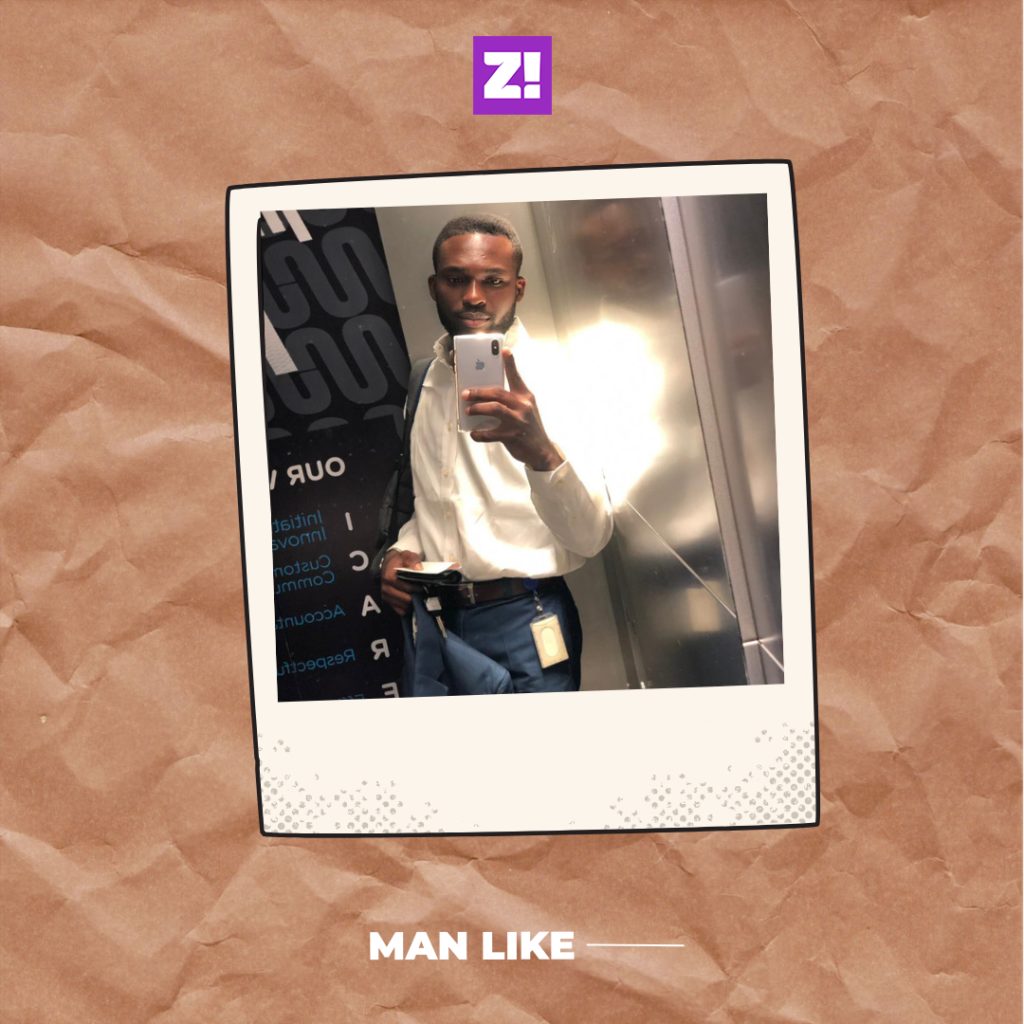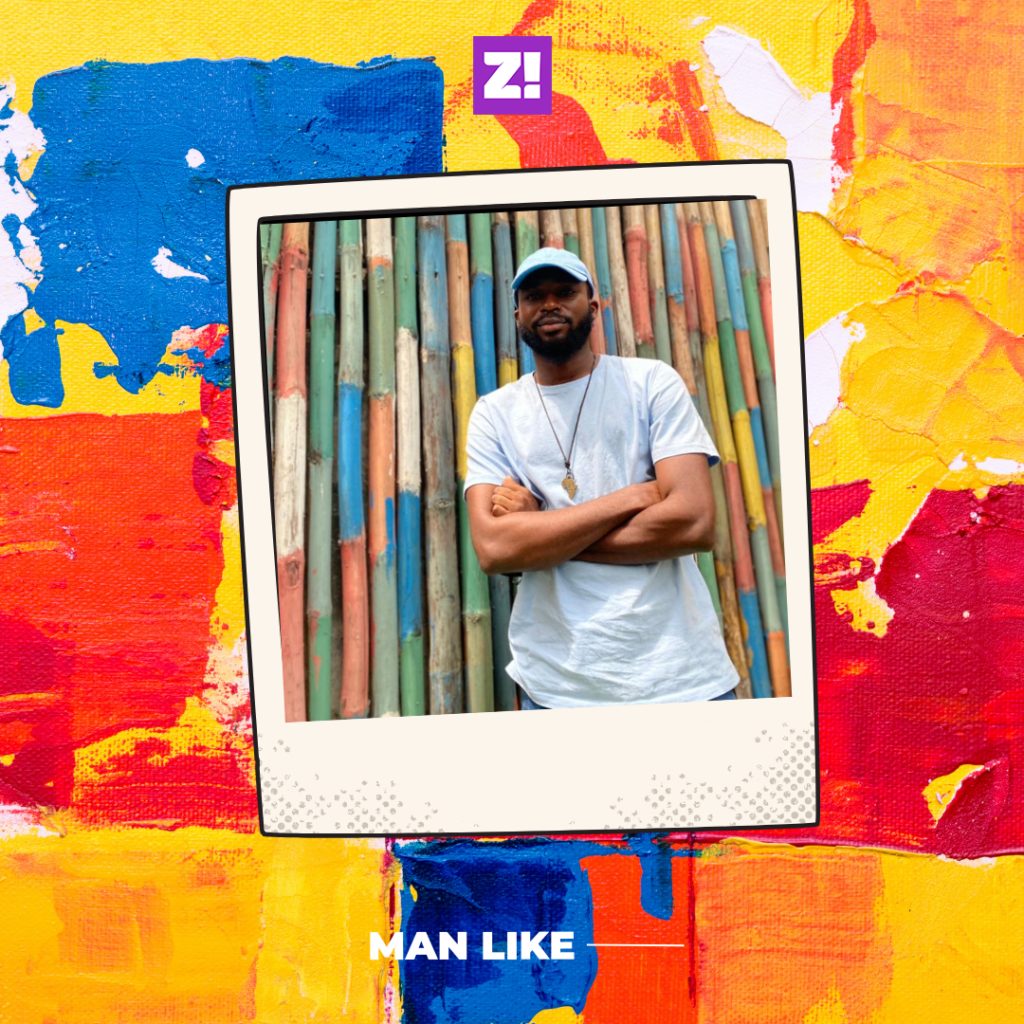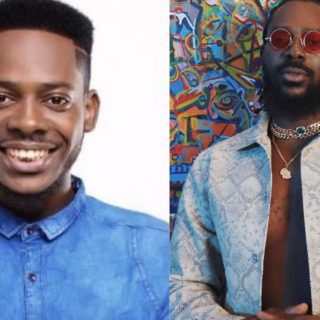What does it mean to be a man? Surely, it’s not one thing. It’s a series of little moments that add up. Man Like is a weekly Zikoko series documenting these moments to see how it adds up. It’s a series for men by men, talking about men’s issues. We try to understand what it means to “be a man” from the perspective of the subject of the week.
Check back every Sunday by 12 pm for new stories in the Man Like series. If you’d like to be featured or you know anyone that would be perfect for this, kindly send an email.
The subject of today’s Man Like is Timileyin, a project and facilities manager. He talks about his father’s imprint on his character, how his parents’ marriage guides his approach to romantic relationships and why crying is therapeutic.

When did you realise you were a man?
Every time I open an episode of ‘Man Like‘ and see this question, I always wonder if I’m a man yet. When does one become a man? Is it when you move out of your parents’ house or when you get your first job and stop depending on pocket money? Is it when you start giving your parents an allowance?
However, some of the experiences that shaped me as a man happened when I was in university. In my third year, I was out of school for a year. Instead of being idle, I decided to work for my dad’s construction company. I worked every day, Mondays to Saturdays. It was the hardest I had ever worked. The experience made me realise what my dad went through to put food on our table. It made me realise that raising a family, providing and trying to set your kids’ up for success no easy. I realised that combining all those things shouldn’t be just one person’s job — it’s a heavy burden.
Every young man needs that kind of experience so they start to think, early on, “How am I going to provide for my family? How will I make enough money to raise kids.”
Taking a lead cue from my father, I realised that taking care of family is paramount. Seeing what my dad did, I wanted to do even better. Apart from my five siblings, we had two or three cousins living with us at any given time. My father had to provide for about ten people in the household, whether his business was going well or not.
He sounds like a stand-up guy.
I recently received a call from my younger sister who’s in her final year of university. She told me that my dad asked her to send me her school fees invoice. I definitely didn’t see that coming. For context, I have two older brothers ahead of me. So asking me to pay her school fees was a big leap. It was a “wait, I’m really getting old” moment. It was the first time I was responsible for someone.
What was your relationship with your father like?
One of the most important things about my father is that he always showed up. Perhaps owning his own business made him wiggle room to always make time for his kids. Along with my mom, they were very present in our lives and we never lacked support from either of them. However, I feel like we could have had a better relationship.

How so?
As I said, he always showed up. School events, matriculations, graduations and prize giving days (because, you know, I’m smart like that), he was always there with my mother. In a way, it felt like he owed that to us as part of his promise to give us the best education he could afford.
However, I think there were some points in my life where I could have used a good father-son conversation. But we didn’t have a relationship like that. The only time we had a semblance of that was when I was working with him during the year I was out of school. We mostly just got along and vibed with each other on the peripheral, but I think it could have been a more rewarding relationship.
Our relationship has evolved now and we have more conversations about my plans but that’s pretty much it. Sometimes I feel like he could have been closer to us, his children. The typical African parent approach of punishing every transgression might have driven a wedge between us.
What other lessons did you learn from your father?
Diplomacy in relationships. I learned this from my mother and father. In the 20+ years I lived with them, I only saw them quarrel three times. Hours after they fight, you’ll find them laughing with each other. Their relationship gives me joy. They were always in each other’s spaces and faces and you could tell that they loved each other deeply. My parents are my blueprint for approaching relationships.
So how do you approach relationships?
Communication is very important to me. I need to know that a romantic partner puts all their cards on the table. Things you hide invariably begin to fester and that causes animosity and resentment. That’s a death sentence for any relationship. There will be fights but that’s natural because you’re different people. The approach to that should be “us vs. the problem”, not “me vs. my partner.”
That’s a wholesome way to handle romantic relationships. What about platonic relationships?
I handle my platonic relationships just the same way. I am up-front about the relationship and make sure fights don’t linger. I ensure there’s an open line of communication at all times. To me, the bro code means being present in your friends’ lives. It means that your friends know that there is always a safe space with you. It’s not about encouraging or covering up bad behaviour for your friends.
Not unrelated – what are your thoughts about how Nigerian men handle toxic masculinity?
I don’t think toxic masculinity as a concept should even exist. I don’t believe people should cage themselves and not do what comes naturally to them, regardless of their gender. It doesn’t matter what people think. It doesn’t matter if people think you’re being “feminine.”

Interesting.
One time, I was hanging out with a female friend. A male friend called and after the conversation, I ended the call with “I love you, my guy.” She was shocked and asked if I was gay. This is the same mentality older Nigerians have about how men should act. We claim to be smarter and more exposed than the older generation but still hold on to harmful views. We tell men to be strong, not to show emotion, not to cry. Men owe it to themselves to unlearn such harmful views and teach the younger generation that it’s okay to show emotion. Crying doesn’t make you less of a man. It’s therapeutic and really eases the tension you’re feeling.
Toxic masculinity also makes it difficult for men to seek help for mental health issues despite the immense trauma we go through as Nigerians. It’s also the reason Nigerian men don’t look after themselves because they think skincare is feminine. Is it only women that have skin?
Speaking of women – what was your most memorable heartbreak?
LMAO, ah! I don’t think I’ve experienced heartbreak a lot but the most memorable one had to be the person who broke up with me because I was too broke. Fresh out of school, I had just started working. I had small change in my pocket so I didn’t think I was that broke. Omo. It shook me to my core. I guess she had expectations I wasn’t meeting.
Did you cry?
Nah. The last time I cried was when I had a fight with someone I was dating. It was a long-distance relationship and it just seemed very frustrating. Not having your person by your side and fighting them at the same time was just overwhelming. I don’t cry a lot but I found it therapeutic.
Check back every Sunday by 12 pm for new stories in the Man Like series. If you’d like to be featured or you know anyone that would be perfect for this, kindly send an email.
Are you a man who would like to be interviewed for a Zikoko article? Fill this form and we’ll be in your inbox quicker than you can say “Man Dem.”




